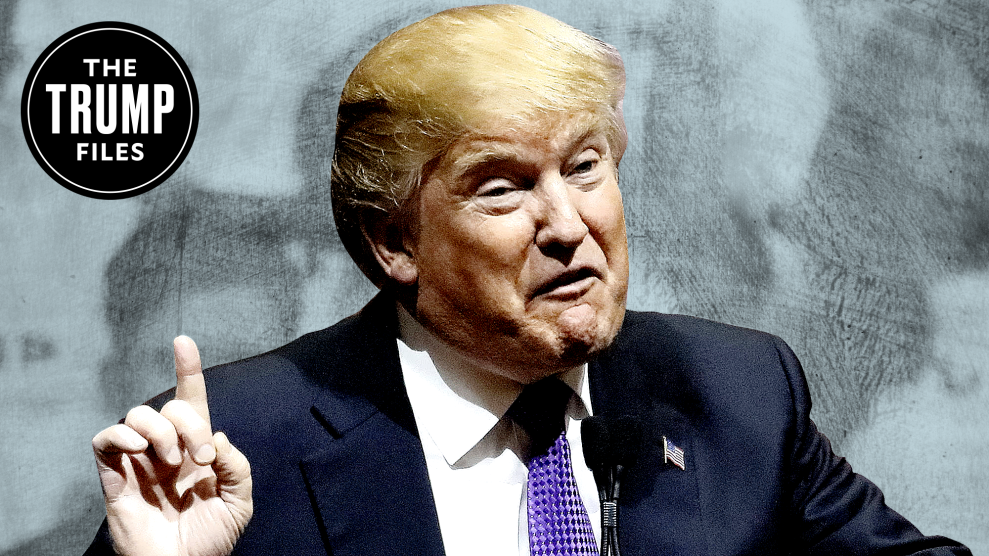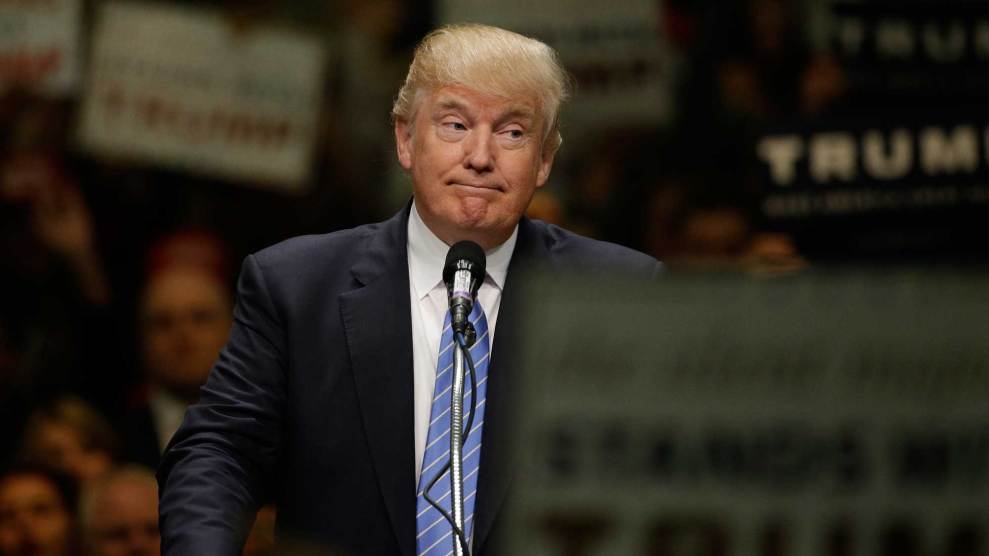In 2012, the Republican Party was so hot to hype its love of “American exceptionalism” that it devoted one of the party platform’s seven sections to this notion. In this document, the GOP proclaimed that it embraced “American exceptionalism—the conviction that our country holds a unique place in human history.” But with Donald Trump now the Republicans’ presumptive presidential nominee, the party may have to delete this doctrine from the platform it will be constructing at its upcoming convention in Cleveland, because Trump has explicitly declared that he does not believe in American exceptionalism.
In late April 2015, a month before Trump officially announced his candidacy, he spoke at an event called “Celebrating the American Dream” that was hosted in Houston by the Texas Patriots PAC, a local tea party outfit. The mogul sat in an oversized leather chair and fielded questions from Jim “Mattress Mack” McIngvale, a prominent local businessman. About an hour into the program, McIngvale posed Trump this query: “Define American exceptionalism. Does American exceptionalism still exist? And what do we do to grow American exceptionalism?”
Trump didn’t hesitate to shoot down the premise of the question, saying he didn’t “like the term.” He questioned whether the United States was “more exceptional” and “more outstanding” than other nations. He also said that those who refer to American exceptionalism were “insulting the world” and offending people in other countries, such as Russia, China, Germany, and Japan. It is “not a nice term,” he said, maintaining it was wrong to equate patriotism with a belief in American exceptionalism. He derided politicians who use the phrase.
Explaining his negative reaction to this idea long cherished and promoted by Republicans and Democrats, Trump said, “perhaps that’s because I don’t have a very big ego, and I don’t need terms like that.” Audience members laughed in response. Trump added, “I want to take everything back from the world that we’ve given them. We’ve given them so much.” He suggested that were he to become president, he would make the United States exceptional.
Here is Trump’s complete answer:
I don’t like the term. I’ll be honest with you. People say, “Oh he’s not patriotic.” Look, if I’m a Russian, or I’m a German, or I’m a person we do business with, why, you know, I don’t think it’s a very nice term. We’re exceptional; you’re not. First of all, Germany is eating our lunch. So they say, “Why are you exceptional. We’re doing a lot better than you.” I never liked the term. And perhaps that’s because I don’t have a very big ego and I don’t need terms like that. Honestly. When you’re doing business—I watch Obama every once in a while saying “American exceptionalism,” it’s [Trump makes a face]. I don’t like the term. Because we’re dealing—First of all, I want to take everything back from the world that we’ve given them. We’ve given them so much. On top of taking it back, I don’t want to say, “We’re exceptional. We’re more exceptional.” Because essentially we’re saying we’re more outstanding than you. “By the way, you’ve been eating our lunch for the last 20 years, but we’re more exceptional than you.” I don’t like the term. I never liked it. When I see these politicians get up [and say], “the American exceptionalism”—we’re dying. We owe 18 trillion in debt. I’d like to make us exceptional. And I’d like to talk later instead of now. Does that make any sense? Because I think you’re insulting the world. And you, know, Jim, if you’re German, or you’re from Japan, or you’re from China, you don’t want to have people saying that. I never liked the expression. And I see a lot of good patriots get up and talk about Amer—you can think it, but I don’t think we should say it. We may have a chance to say it in the not-too-distant future. But even the, I wouldn’t say it because when I take back the jobs, and when I take back all that money and we get all our stuff, I’m not going to rub it in. Let’s not rub it in. Let’s not rub it in. But I never liked that term.
When Trump finished those remarks, the crowd was largely silent, and McIngvale moved on to another subject. Yet Trump had just trampled one of the mainstay tenets of GOP ideology—and undercut a line of attack often used by Republicans.
In the Obama years, GOPers and conservatives have frequently assailed the president for not truly believing that the United States holds a special place in the world. During the 2012 campaign, Mitt Romney declared, “Our president doesn’t have the same feeling about American exceptionalism that we do.” Last year, Gov. Bobby Jindal (R-La.), when he was running for president, asserted that Obama “won’t proudly proclaim American exceptionalism.” These efforts aimed to undermine Obama’s standing as a true American leader (though Obama has indeed stated his belief in American exceptionalism) and were somewhat related to the birther campaign that claimed Obama was not even a legitimate born-in-the-USA American citizen.
So it may seem odd that Trump, the king of birtherism and a fellow who markets himself as an American success story, does not accept American exceptionalism and has not adopted the GOP strategy of using it as a cudgel against Obama. But the folks drafting the GOP platform this year may want to take note: scratch American exceptionalism. Unless, of course, Trump wins in November. Then, in his mind, the United States would truly be on its way toward becoming outstanding.













